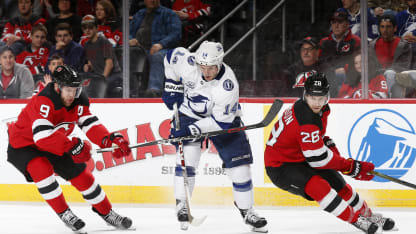On the "which team would you rather face" question:
If fans are asking this question during the closing weeks of the regular season, it means that their team is in good shape to make the playoffs. So the focus shifts from "will our team make it in?" to "what's the best matchup for our team in the first round?". Notice that fans of the Colorado Avalanche, who qualified for the postseason by beating St. Louis in their final regular season game, weren't speculating in recent weeks about the challenges of a first round matchup with Nashville, which won the President's Trophy. (Maybe they are now that the Avs are in).
Mishkin's Musings: Thoughts on Lightning-Devils
Lightning broadcaster Dave Mishkin shares his opinions on the Lightning's first round matchup

© Adam Hunger
Jon Cooper was asked about potential matchups prior to the Lightning's regular season finale in Carolina and he responded: "You never wish for an opponent. You just wish to get in and whoever lands in your lap, that's who you've got to play".
Cooper is right. No matter the opponent, a team cannot expect anything but a hard-fought, closely contested series. The 16 clubs that qualified for the playoffs are all excellent teams. They all have terrific players. All are well coached. All have endured tough moments during the long 82-game regular season and persevered.
It is true that teams may have slightly different styles, so the challenges of a specific matchup can vary from series to series. But attempting to predict what "type" of opponent is best-suited for your team is, in my opinion, a fruitless exercise. Ultimately, there are common denominators for success in a series - and they transcend particular styles. Execute well as a team. Produce big plays at key times. Get solid to great goaltending. And benefit from timely puck-luck.
On whether the results from the regular season series matter:
In a word … no. The playoffs are a completely different animal from the regular season. Intensity is higher. The pressure is amped up. The schedule is less grueling and gives neither team an advantage (which can happen in the regular season).
Here are some examples from previous Lightning seasons. In 2013-14, the Lightning went 3-0-1 during the regular season series against Montreal. But, despite owning home-ice advantage, they lost four straight to the Canadiens during their first round series. In 2004, the Lightning defeated the Islanders, four games to one, in their first round series. But they had lost three of four to New York during the regular season, including two losses just a few weeks before the playoffs began.
On the other side of the coin, the 2014-15 Lightning went 5-0 against Montreal during the regular season and did beat the Habs in a second round series, four games to two. In that same season, the Lightning swept the New York Rangers, three games to none, in the regular season. In the Eastern Conference Final, the Lightning edged the Rangers, four games to three. But in both situations, even though the Lightning followed up a regular season series win with a playoff triumph against the same opponent, the feel of those playoff games was completely different and the regular season results had no bearing on what occurred in the postseason.
So the fact that the New Jersey Devils won all three games against the Lightning in their regular season series doesn't mean that the Devils definitely are going to win this first round series. But, it also doesn't mean that they definitely aren't.
On what we can learn from the regular season series between the teams:
While the Devils did win all three of those regular season games, each was a close contest. The first one went to the shootout and the other two were one-goal games. Certainly, in none of the three did the Lightning play a perfect game. On the other hand, they did a number of good things in all of them, despite the result.
The first contest took place at Newark in mid-October. The Devils outscored the Lightning in the first period, 3-2, but the Lightning carried play for much of the final two frames. They eventually rallied to take a 4-3 lead before the Devils tied it on a late third period power play goal. What was most noticeable about this contest was the Devils' high-octane, speed game. On numerous occasions, they caught the Lightning in transition and generated dangerous chances off the rush. This occurred even as the Lightning were generally controlling play in the second and third periods and enjoying most of the puck possession.
The Devils' team speed hurt the Lightning in the second meeting, too. This one, at Amalie Arena in mid-February, once again featured a high volume of odd-man rush chances for the Devils. The big story from this game, however, was the play of Eddie Lack. He finished with a career-high 48 saves as the Lightning posted a season-high 51 shots, including a multitude of Grade-A scoring chances. The Lightning tied a franchise record for most shots in a regular season game that did not go to overtime. So while the Bolts struggled with their rush coverage in this game, they were extremely dangerous on the attack themselves.
Then there was the third game, played in Newark in late March. This game stood in stark contrast to the other two. Both teams defended hard and limited turnovers. There were very few, if any, dangerous chances off the rush. It was the best defensive performance for both teams in the season series.
Is there anything to be taken from these three games? If the Lightning want to limit New Jersey's rush chances, they will have to manage the puck well in the neutral and offensive zones. Otherwise, the high-skill forwards on New Jersey will cause problems. Taylor Hall has had an MVP-worthy season, posting a career-best 93 points, 41 more than the next closest Devil, rookie Nico Hischier. Keeping the goals against number down against New Jersey will include an effective penalty kill. And, as compared to their difficulties generating scoring chances in the final meeting, the Lightning will need to get pucks to the New Jersey net and try to capitalize on second chances (the one goal they scored in that last game against New Jersey came on a rebound).
But here's a follow-up on my earlier point about specific matchups and styles. These components - good rush and d-zone coverage, solid puck management, strong penalty killing and scoring "dirty" goals - are going to be important elements for success, no matter the opponent.


















